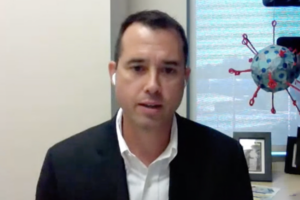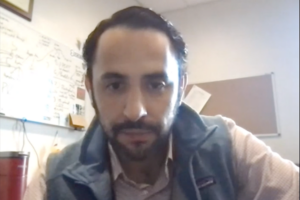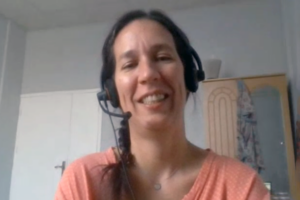
During the Sunday session, Critical Care in Global Health: From Ebola to COVID-19 and Beyond, an international panel of physicians talked about the needs and challenges of providing critical care medical services in low-resource settings, including important lessons learned from past virus outbreaks as well as the current COVID-19 pandemic. Session co-chairs Orlando Garner, MD, and Aditya Nadimpalli, MD, led the panel discussion.
William Fischer, MD, Director of Emerging Pathogens at the University of North Carolina Institute of Global Health and Infectious Diseases, began the session with a discussion about his experiences working alongside critical care physicians in West Africa treating patients with Ebola. Improving care, he said, begins with improving access.

“It’s not just about access of patients to providers, but also providers to patients,” Dr. Fischer said. “And success of vaccines and therapeutics, in addition to efficacy and safety, must also consider access.”
Community-centric strategies must be implemented and embraced, he said, but the implementation must be patient-centric, so education and training of local health workers is crucial.
“Learning at the bedside has to be prioritized, and this can be done through the use of clinical research,” he said. “In addition to investing in research infrastructure, we also have to invest in local investigators so that we can create a sustainable research effort along with increased research capacity.”
Ultimately, Dr. Fischer said, outbreak response must evolve from isolation to integrated cycles of preparation, response, and recovery.

“It’s time to reintegrate into hospitals so that increased critical care capacity is sustained, not just for Ebola but for every other disease as well,” he said.
Aurélie Godard, MD, Intensivist and Anesthesiologist at Regional Hospital Center in Saint-Brieuc, France, discussed the challenges of providing critical care in humanitarian settings, including her work with Doctors Without Borders treating patients with COVID-19 in Yemen.
Dr. Godard said inherent logistic and scientific constraints have only compounded challenges in the ICU setting during the pandemic, leading not only to practical point of care concerns, but ethical concerns as well.

“COVID-19 shed light on ICU needs and the scarcity of resources and people to look after critically ill patients in many places around the world,” Dr. Godard said. “And it has triggered many ethical questions, such as decisions about how to treat critically ill patients when you don’t have enough oxygen for basic needs.”
Initiatives to implement essential emergency and critical care (EECC) concepts in low-resourced regions and countries are ongoing.
“The need is there, but feasibility is still a question in many places because the sustainability of complex care is difficult to ensure,” Dr. Godard said. “It begins with access to at least basic needs for every critically ill patient everywhere in the world and then building up to more developed and more complex ICU care.”
In the session’s final presentation, Richard Kojan, MD, ICU Specialist at Kinshasa Teaching Hospital in the Democratic Republic of the Congo in Africa, discussed the challenges of responding to Ebola virus outbreaks and care for critically ill patients, particularly in rural areas of the country, and the need to close the quality-of-care gap that exists between high- and low-income countries.

“For example, Ebola mortality from rich countries is under 20%, but is between 50% and 90% in regions of my country,” Dr. Kojan said. “In contrast to high-income countries, for example, EVD patients in low-income settings have been provided with minimal care services during different outbreaks, in order to protect caregivers and health care facilities from possible contamination. This is one of the major reasons for high mortality in our regions.”
Dr. Kojan said advances in technology, such as the development of the first portable biosecure emergency care unit for epidemics, known as the CUBE, will help health workers in his country provide improved care to rural patients.
“Today we think that with new technologies, there are ways to continually update on best practices for the best intensive and emergency care for populations in rural and low-resource regions,” he said. “There is no reason to have a different standard of care between rural and rich areas anywhere in the world.”
Missed this session? Watch the recording in the “Live Session Recordings” tab of the On Demand section in the meeting platform. Recordings will be available approximately 48 hours after the original session time.
NOW IN SESSION
CHEST 2021 • OCTOBER 17-20 • INFORM. INSPIRE. INNOVATE.
Immerse yourself in the experience of CHEST 2021! Your registration includes hundreds of sessions presented by our top faculty and featured speakers, live discussions with the experts, interactive gaming, and much more. Even better, you’ll have access to everything (including post-meeting bonus content) until October 2022!
Haven’t registered yet? It’s not too late. Register now for full access.





